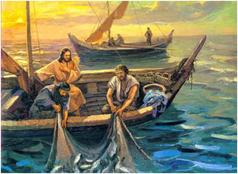
In today’s Sunday Gospel, the last before Ash Wednesday, Jesus commands Simon Peter to go deeper. Notice that Simon wasn’t paying any attention to Jesus at first. Picture the scene as if it were you, Joe University Student: imagine that you’re unloading boxes from your pickup at the Engineering Building on campus. You’re vaguely aware of a street preacher addressing a crowd of students nearby. Then the preacher walks over and gets into the passenger side of your truck. “Please take me downtown,” he says. You get in without question and begin driving. He looks at you and says, “The superficial mediocrity of American college life is not enough for you. Go deeper.”
Jesus is preaching to a crowd on the lakeshore. Simon, a professional fisherman, was not paying any attention, apparently—he was busy making a living, cleaning his nets after a frustrating and useless night’s work. Jesus steps into Simon’s boat, without asking permission, and asks to be taken a distance from the shore. He preaches from the boat, while Simon, who is weary from a hard night’s work, waits patiently. But he too listens. Then Jesus commands Simon in those perennial words: Duc in altum. “Put out into deep water, and lower your nets for a catch.” It was one of John Paul II’s favorite lines. He quotes these words of Christ at the beginning of his apostolic letter guiding us into the Third Millennium, Novo millennio inuente. Duc in altum.
Go Deep
Simon, Simon Bar-Jonah: you have worked hard, but you have caught nothing, because you have not gone deep. You live your faith superficially; you keep your life in the shallows. You’ll catch nothing there. Let me show you how to go deep, teach you the virtue of holy daring, of trustful surrender to providence.
Simon replies: “Master, we have worked hard all night and have caught nothing. But at your command, I will lower the nets.” Simon’s acquiescence to Christ’s command defines the rest of St. Peter’s life, and the life of the Church. He makes the decision to trust Him whom he grasps intuitively to be Lord and Messiah. “Master,” he addresses him, “at your command I will lower the nets.” And having once trusted Jesus, Peter is flooded by a superabundance of life—a great number of fish flapping and slapping and breaking through the nets, and the other boats rushing over to assist their partners.
Simon’s Terror
Peter sinks before Jesus: “leave me Lord, for I am a sinful man.” He realizes with terror that the thrice-holy Lord and King of Isaiah’s vision (in our first reading) sits before him. Like Isaiah, Peter cries out “Woe is me: I am a man of unclean lips living among a people of unclean lips!” But even as he cries out, Simon hopes that Jesus will touch a burning ember to his lips, will raise him up from the bottom of his boat and make an Apostle of him. And so Jesus utters his third command: “Do not be afraid (another of John Paul II’s favorite lines): from now on you will be catching men.” Simon and his partners left immediately everything and followed him.
Building a Civilization of Love
I like to think that Thomas Aquinas College is the last best hope for western civilization. The lights are going out in the west (my seminary moral theology teacher would often say that “the 21st Century belongs to the Pacific”). The curtain is falling on 18 centuries of Christian-inspired philosophy, scientific method, jurisprudence and economics, art, literature, and music. Our culture is regressing to a superficial humanism, an attempt at enlightened paganism, which will bear only dissatisfaction and violence.
Jesus needs fishers of men to build the Kingdom of God. He climbs into our boat and directs us to go deep into the Christian culture which is our patrimony. Our work now is that of students, fully assimilating the philosophy and theology offered so freely here at our College. But there will come a time to give back what we have received, to engage deeply the society in which we live. If all we do is keep the faith to ourselves, we have failed Jesus Christ. We must cast out the great net of a deeply imbued Christian culture, and then we will certainly catch souls for God. John Paul II calls this the New Evangelization, and Benedict XVI calls it a Year of Faith.
What will you do with your TAC education? How will you deepen your life and lower your nets for a catch? What and who will you catch for Jesus Christ? Do not be afraid of failure, for it is Christ himself who commands us. He stays within our boats as we cast the nets. With Our Lady, we dedicate ourselves to working alongside the Lord, building a civilization of love.


 RSS Feed
RSS Feed